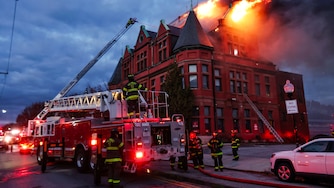The recording at the center of the prosecution’s case against Anne Arundel County Orphans’ Court Judge Marc Knapp is not admissible at trial, a Circuit Court judge ruled Tuesday.
Judge Christine M. Celeste determined that the June 4, 2024, recording that Knapp allegedly made of his probate court colleagues’ deliberations was obtained with an illegal warrant.
While Celeste determined that there was enough probable cause that a crime occurred for a judge to issue the warrant, “the court does find that the warrant is facially lacking in particularity” and runs afoul of Maryland law requiring police to be specific about what they’re looking for on a suspect’s cellphone.
Knapp’s attorney, Peter O’Neill, said the recording “essentially” amounts to the state’s entire case, though it is up to the Office of the State Prosecutor whether to continue the prosecution.
“They can’t prosecute without introducing the recording,” O’Neill told The Baltimore Banner.

Deputy State Prosecutor Sarah David, who argued the case alongside Assistant State Prosecutor Stephanie Haddad, declined to comment after Tuesday’s hearing.
State Prosecutor Charlton T. Howard III declined to comment about what his office would do with the case.
State prosecutors secured an indictment against Knapp in December. It followed a highly public dispute between Knapp and Chief Orphans’ Court Judge Vickie Gipson that featured a peace order, a police visit to the court and dueling judicial complaints that ultimately ended with ethics charges filed against both judges.
Each is accused of violating numerous provisions of the Code of Judicial Conduct during arguments in chambers, court proceedings and in comments to news organizations. Attorneys who investigated them for the commission described their behavior as mutually “unprofessional,” although they labeled Knapp as the “aggressor.”
Gipson called police to the Orphans’ Court office on June 20, 2024, alleging that Knapp was violating a temporary protective order that she had secured against him. The order allowed Knapp to have contact with Gipson and another member of the probate bench so long as it was in their official capacity. It barred Knapp from harassing his colleagues or misusing technology.
“The person has been ordered not to harass and he has been doing intimidating things in the workplace,” Gipson told the 911 operator, according to a recording played in court.
Anne Arundel County Police Cpl. Joseph Mastros and Sgt. Heather Whitaker responded to the Orphans’ Court. Once there, they testified, Gipson and another judge told them they were concerned about Knapp recording them illegally.
When the officers spoke with Knapp, he acknowledged having “a whole bunch of recordings on his phone” but said he only recorded himself speaking, according the officers’ body camera footage played in court. He also expressed concern about the possibility of officers taking his cellphone, saying that he planned to travel out of the country and needed it.
“You guys take this phone away and I’m totally screwed,” Knapp told the officers.
The officers tried to reason with Knapp, suggesting they could tape the recordings with their body cameras to avoid seizing his phone. Knapp said he was “more than happy” to oblige.
But then Whitaker noticed there were fewer recordings on Knapp’s phone than she had originally seen. She asked Knapp about that.
“I might’ve deleted those,” Knapp said.
“So, we’re going to take your phone,” Whitaker interjected. “And I’m sorry, but you can’t delete evidence while we’re standing here talking to you.”
Prosecutors argued that Knapp’s actions amounted to exigent circumstances that allowed police to seize the phone without a warrant. Over O’Neill’s objections, Celeste agreed with the prosecution on that point.
But then Mastros had to apply for a warrant to allow police to extract data from the phone.
Mastros asked a judge to allow officers to look for any “stored media that would contain fruits or evidence of the crime,” “all stored phone applications that collect and store video and/or voice recordings” and “stored IP addresses and network data from the selected time frame.” He did not specify a time frame.
Anne Arundel Circuit Judge Ginina A. Jackson-Stevenson signed the warrant.
Recognizing that cellphones have become living diaries of a person’s life, which can include highly personal information, Maryland courts have placed limits on warrants to search phones. Court rulings prohibit police from using “catch-all” phrases in their applications.
Prosecutors David and Haddad argued that the warrant in Knapp’s case was specific enough because it was probing for audio recordings. Officers, they argued, couldn’t specify which recordings they were looking for without listening to them, not to mention that there was no way of knowing which recordings Knapp deleted.
O’Neill countered, saying the warrant was effectively approved to “dive into this phone and look at anything you want.”
Celeste sided with O’Neill.




Comments
Welcome to The Banner's subscriber-only commenting community. Please review our community guidelines.